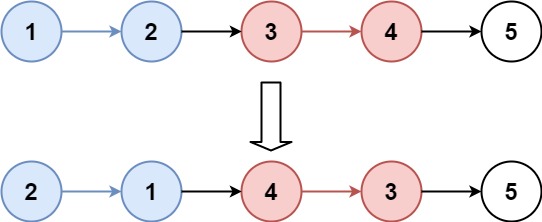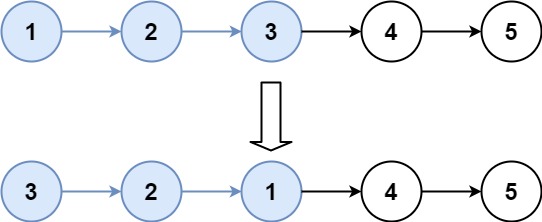LeetCode-in-All
25. Reverse Nodes in k-Group
Hard
Given a linked list, reverse the nodes of a linked list k at a time and return its modified list.
k is a positive integer and is less than or equal to the length of the linked list. If the number of nodes is not a multiple of k then left-out nodes, in the end, should remain as it is.
You may not alter the values in the list’s nodes, only nodes themselves may be changed.
Example 1:

Input: head = [1,2,3,4,5], k = 2
Output: [2,1,4,3,5]
Example 2:

Input: head = [1,2,3,4,5], k = 3
Output: [3,2,1,4,5]
Example 3:
Input: head = [1,2,3,4,5], k = 1
Output: [1,2,3,4,5]
Example 4:
Input: head = [1], k = 1
Output: [1]
Constraints:
- The number of nodes in the list is in the range
sz. 1 <= sz <= 50000 <= Node.val <= 10001 <= k <= sz
Follow-up: Can you solve the problem in O(1) extra memory space?
Solution
# Definition for singly-linked list.
# class ListNode
# attr_accessor :val, :next
# def initialize(val = 0, _next = nil)
# @val = val
# @next = _next
# end
# end
# @param {ListNode} head
# @param {Integer} k
# @return {ListNode}
def reverse_k_group(head, k)
return head if head.nil? || head.next.nil? || k == 1
j = 0
len = head
# Loop for checking the length of the linked list.
# If the linked list is less than k, then return as it is.
while j < k
return head if len.nil?
len = len.next
j += 1
end
# Reverse linked list logic applied here.
c = head
n = nil
prev = nil
i = 0
# Traverse the while loop for K times to reverse the node in K groups.
while i != k
n = c.next
c.next = prev
prev = c
c = n
i += 1
end
# head points to the first node of the reversed K group,
# which is now going to point to the next K group linked list.
# Recursion for further remaining linked list.
head.next = reverse_k_group(n, k)
prev
end

